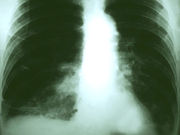Improved progression-free survival for patients treated with therapy not containing erlotinib
WEDNESDAY, Aug. 3, 2016 (HealthDay News) — Targeted therapies that do not contain erlotinib can be beneficial for patients with KRAS-mutated (KRAS mut+) advanced non-small-cell lung cancer (NSCLC), according to a study published online Aug. 1 in the Journal of Clinical Oncology.
Vassiliki Papadimitrakopoulou, M.D., from the University of Texas MD Anderson Cancer Center in Houston, and colleagues examined the effects of targeted therapies in NSCLC. Patients were randomized to four arms: erlotinib (22 patients), erlotinib plus MK-2206 (42 patients), MK-2206 plus AZD6244 (75 patients), or sorafenib (61 patients).
The researchers found that the primary end point of an eight-week disease control rate (DCR) was 48 percent in all 186 evaluable patients (32, 50, 53, and 46 percent, respectively, for the four treatment arms). For the 27 percent of patients who were KRAS mut+, DCR was 20, 25, 62, and 44 percent, respectively, compared with 36, 57, 49, and 47 percent, respectively, for KRAS wild-type patients. Median progression-free survival was 2.0 months: 1.8 and 2.5 months for arms 1/2 and 3/4, respectively, in KRAS mut+ patients (P = 0.04). In KRAS wild-type patients, median overall survival was 6.5 months: 9.0 and 5.1 months in arms 1/2 and 3/4, respectively (P = 0.03).
“Despite improved progression-free survival on therapy that did not contain erlotinib for KRAS mut+ patients and improved prognosis for mesenchymal tumors, better biomarker-driven treatment strategies are still needed,” the authors write.
Several authors disclosed financial ties to biopharmaceutical companies, including Merck and Bayer Healthcare Pharmaceuticals, which supported the study.
Copyright © 2016 HealthDay. All rights reserved.








